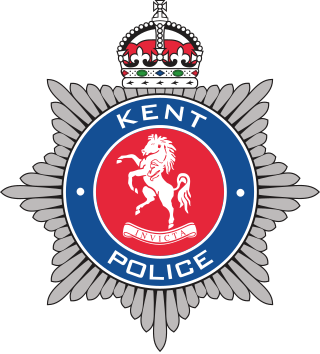
The Spaghetti House siege took place between 28 September and 3 October 1975. An attempted robbery of the Spaghetti House restaurant in Knightsbridge, London, went wrong and the police were quickly on the scene. The three robbers took the staff down into a storeroom and barricaded themselves in. They released all the hostages unharmed after six days. Two of the gunmen gave themselves up; the ringleader, Franklin Davies, shot himself in the stomach. All three were later imprisoned, as were two of their accomplices.
Cop Shop is a long-running Australian police drama television series produced by Crawford Productions that ran for seven seasons between 28 November 1977 and 23 July 1984. It comprised 582 one-hour episodes.

Kent Police is the territorial police force responsible for policing the 1,433 sq mi (3,710 km2) and approximately 1.8 million inhabitants of Kent, a county in the south east of England.

Sussex Police is the territorial police force responsible for policing in the whole of Sussex. Its jurisdiction covers the ceremonial counties of East Sussex and West Sussex. The force is headquartered in Malling House, Lewes, East Sussex.

Carry On Constable is a 1960 British comedy film, the fourth in the series of 31 Carry On films (1958–1992). It was released in February 1960. Of the regular team, it featured Kenneth Connor, Kenneth Williams, Charles Hawtrey, Joan Sims, and Hattie Jacques. Sid James makes his debut in the series here, while early regulars Leslie Phillips, Eric Barker, and Shirley Eaton also turn up, although Phillips did not appear again in the series for 32 years. It was the first "Carry On..." film to include some nudity with Connor, Hawtrey, Williams, and Phillips baring their behinds during a shower scene.

Brooklyn South is an American ensemble police drama television series that aired on CBS for one season from September 22, 1997, to April 27, 1998. It was aired during the 1997–98 television season. The series was co-created by Steven Bochco, Bill Clark, David Milch, and William M. Finkelstein.

Dale "Smithy" Smith is a fictional character from the British television police procedural The Bill, played by Alex Walkinshaw. He first appeared in the fifteenth series episode "Cowardice", broadcast on 20 July 1999. Dale was introduced as a police constable, before later being promoted to sergeant and inspector.

Bukit Kepong incident was an armed encounter in 1950 during the Malayan Emergency between the Federation of Malaya Police and the guerrillas of the Malayan National Liberation Army (MNLA), the armed wing of the Malayan Communist Party (MCP). This conflict took place in an area surrounding the Bukit Kepong police station in Bukit Kepong. The wooden station was located on the river banks of the Muar River, about 59 km from Muar town, Johor.
"Fatal Consequences" is an episode of the long-running ITV police-procedural drama series, The Bill. The episode is significant in the show's history as it is the first of two episodes broadcast live. Fatal Consequences was broadcast live on 30 October 2003 at 8:00pm, to commemorate the 20th anniversary of the show's pilot episode, "Woodentop". The episode was written by Tom Needham, directed by Sylvie Boden and produced by Susan Mather and Donna Wiffen. The episode was watched by over 10 million viewers
From the ITV police drama's first screening in 1983, the history of The Bill includes a variety of major plotlines and changes to the programme's format.

Series 22 of British television drama The Bill was broadcast from 4 January until 28 December 2006. The series consisted of 91 episodes, as two episodes from the series remain unaired after the master tapes were stolen in a robbery at the show's recording studios in November 2006. Under new producer Johnathan Young, this series saw the programme begin to step away from the serialised format, and return much of the focus to the actual policing aspect of the programme, removing the more 'soap' feel previously introduced by Paul Marquess. Most episodes consisted of two parallel stories running at the same time, much like the initial transition to hour-long episodes in 1998. However, some episodes feature entirely on one story, beginning the move back to single-themed episodes as part of a plan to completely remove serialisation - which did not take place until 2007. The series also saw a large portion of cast changes in the first few months, with a number of characters previously introduced by Marquess being axed to make way for new blood - many of them support staff and non-police officer characters. Young believed that several of the characters introduced by Marquess did not have the longevity of the more well-known characters in the show, and thus decided to give a number of highly recommended up-and-coming actors roles on the show, such as Kidulthood star Aml Ameen.

The Bill is a British police procedural television series, first broadcast on ITV from 16 August 1983 until 31 August 2010. The programme originated from a one-off drama, Woodentop, broadcast in August 1983.
"Frontline" was a three-part storyline in the long-running police procedural British television series The Bill. Broadcast in 2008, the storyline is significant in the show's history as it was the final plot to feature the death of an on-screen character, PC Emma Keane, which came in the first part of the plot.
"The Anniversary, Part Two" is an episode of the long-running ITV police-procedural drama series, The Bill. The episode is significant in the show's history as it is the second of two episodes broadcast live. The Anniversary, Part 2 was broadcast live on 22 September 2005 at 8:00pm, to commemorate the 50th anniversary of ITV1. The episode was written by Graham Mitchell, directed and co-produced by Sylvie Boden, and produced by Donna Wiffen.

WPC 56 is a British television police procedural series, created and partly written by Dominique Moloney and broadcast on BBC One. The stories feature the first woman police constables (WPC) to join the fictional Midlands Constabulary at Brinford Police Station in 1956. Series one and two focus on Gina Dawson as she struggles to gain acceptance at a male-dominated police station and having to deal with the sexist attitudes that were commonplace at that time.

Dial 999 is a 1955 British crime drama film directed and written by Montgomery Tully based on the novel of the same name by Bruce Graeme. Produced by the British company, Todon Productions, it was shot at the Merton Park Studios in London. RKO Radio Pictures purchased the rights to distribute it in the United States, where it was released in a cut form as The Way Out on 11 April 1956. The film stars Gene Nelson as Greg Carradine, Mona Freeman as Terry Moffat Carradine, and John Bentley as Detective Sergeant Seagrave.
City Central is a British television police procedural drama series, written and created by Tony Jordan, that first broadcast on BBC One on 4 April 1998.










